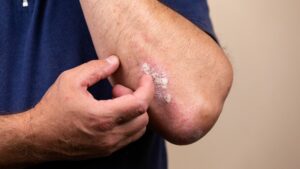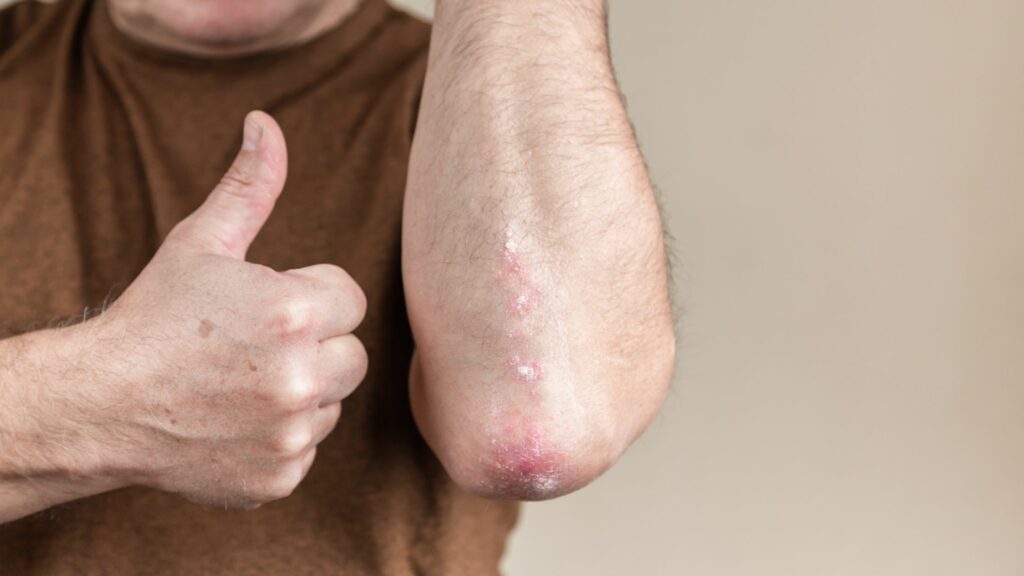Excoriation disorder, also known as compulsive skin picking, is a condition that affects many people around the world. Though it may be normal to experience occasional skin picking, those who have excoriation disorder cannot control their urge to pick at their skin. This can cause significant damage and lead to many other problems. If you or someone you know suffers from excoriation disorder, it is important to seek help. In this blog post, we will discuss what excoriation disorder is, the symptoms, and how to get help.
Contents
What Is Excoriation Disorder?

It is known as compulsive skin picking or dermatillomania is a condition that causes people to compulsively pick at their skin. People with excoriation disorder may pick at their skin for hours at a time, causing bleeding, bruising, and scabbing. The picking can be so severe that it leads to permanent scarring.
People with excoriation disorder often report feeling intense urges to pick at their skin. These urges may be triggered by certain emotions, such as anxiety or boredom. Once someone starts picking, they may find it difficult to stop. The act of picking can provide temporary relief from the urge to pick, but it eventually leads to more skin damage.
What Are The Symptoms Of Excoriation Disorder?

The most common symptom of this disorder is compulsive skin picking. This can manifest in a number of ways but typically involves picking at the skin with the fingers, nails, or other sharp objects. The individual may pick at healthy skin, scabs, or blemishes. Picking can lead to bleeding, bruising, and infection. In severe cases, it can cause disfigurement.
Other symptoms of excoriation disorder include:
- Intense urge to pick at the skin
- Sense of relief or satisfaction after picking
- Picking at different times of the day or night
- Picking in response to stress or anxiety
- Avoidance of social situations
- Isolation and withdrawal from friends and family
- Difficulty concentrating
- Sleep problems
- Depression or anxiety
What Causes Excoriation Disorder?
The exact cause of excoriation disorder is unknown. However, it is believed to be the result of a combination of genetic, environmental, and psychological factors. People with certain psychiatric conditions, such as anxiety disorders and OCD, may be more likely to develop excoriation disorder.
There is also a strong familial link with the condition. This means that if someone in your family has excoriation disorder, you are more likely to develop it as well.
Is Excoriation Disorder Normal?

Persons who suffer from compulsive skin picking will often find themselves wondering if their disorder is “normal.” After all, it’s not something that most people talk about openly. It’s not something that you can see on the outside unless you happen to catch yourself in the act. And even then, you’re usually quick to cover up any evidence of your picking.
So, yes, you’ll wonder if the disorder is normal or not.
The answer is both yes and no. In the sense that there are other people out there who suffer from this same disorder, then yes, it is normal. We are not alone in our struggle. However, in the sense that this is a disorder that causes us significant distress and impairment in our daily lives, then no, it isn’t normal.
Compulsive skin picking is a real mental health condition that needs to be taken seriously. If you or someone you know is struggling with this disorder, please reach out for help. There are resources available to you. You are not alone.
There are a number of different ways to treat this disorder, but finding the right method can be tricky. What works for one person might not work for another. Some people find that therapy is helpful, while others find that medication is necessary. Still, others find that a combination of both is best.
What Are The Different Myths About Excoriation Disorder?

There are many myths about excoriation disorder that can make it difficult to understand. Here are some of the most common myths:
It’s Just A Bad Habit That Can Be Broken
Many people believe that excoriation disorder is simply a bad habit that can be broken. However, this is not the case. It is a mental health condition that requires treatment.
It’s A Type Of Self-Harm
Another myth about excoriation disorder is that it is a type of self-harm. While some people with the condition do engage in self-harmful behaviors, not all do. It can be harmful to the individual even if they do not engage in self-harm.
Same As Dermatillomania
Dermatillomania is a similar condition to excoriation disorder, but there are some key differences. Dermatillomania is characterized by a strong urge to pick at one’s skin. This can result in damage to the skin, but it does not always. On the other hand, always results in damage to the skin.
Excoriation Disorder Is Caused By Stress
Stress can be a trigger for excoriation disorder, but it is not the cause of the condition. There are many other factors that can contribute to the development of excoriation disorder, such as genetics and the environment.
It Only Affects Women
While the majority of people with excoriation disorder are women, it is not a condition that only affects women. Men and women of all ages can be affected by the condition.
It Is Caused By Stress
While stress may be a trigger for some people with excoriation disorder, it is not the cause of the condition. Excoriation disorder is caused by an underlying mental health condition, such as anxiety or depression.
Just A Phase
Another common myth about excoriation disorder is that it is just a phase. However, this is not the case. Excoriation disorder is a chronic and relapsing condition that requires treatment.
No Treatment For Excoriation Disorder
This is not true! While there is no cure for excoriation disorder, there are many effective treatments available. Treatment can help reduce the frequency and severity of skin picking, as well as improve the overall quality of life. If you or someone you know is struggling with excoriation disorder, please seek professional help.
If you or someone you know is struggling with excoriation disorder, it is important to seek help from a mental health professional. Excoriation disorder is a treatable condition. With treatment, people with excoriation disorder can learn to manage their condition and live a healthy and fulfilling life.
What Are The Ways To Treat Excoriation Disorder?

There are two ways to treat excoriation disorder: medication and therapy.
Medications
Medication can be used to help with anxiety and depression, which are often comorbid conditions with skin picking disorder. There are also medications that can help reduce the urge to pick, such as N-acetylcysteine and antipsychotics.
Therapy
Cognitive-behavioral therapy (CBT) is the most effective treatment for excoriation disorder. CBT helps patients identify and change negative thoughts and behaviors that contribute to their skin picking. Other types of therapy, such as habit reversal training (HRT) and dialectical behavior therapy (DBT), can also be effective.
If you or someone you know is struggling with excoriation disorder, please reach out for help. There are many resources available to get you the support you need.
Conclusion
In conclusion, excoriation disorder is not a normal part of life. However, it is a very real and serious condition that can be extremely debilitating for those who suffer from it. If you or someone you know is struggling with compulsive skin picking, there is help available. Seek a qualified mental health professional who can provide treatment and support. With proper care, people with this disorder can lead happy and fulfilling lives.
If you are looking for affordable Online OCD Counseling MantraCare can help: Book a trial OCD therapy session


